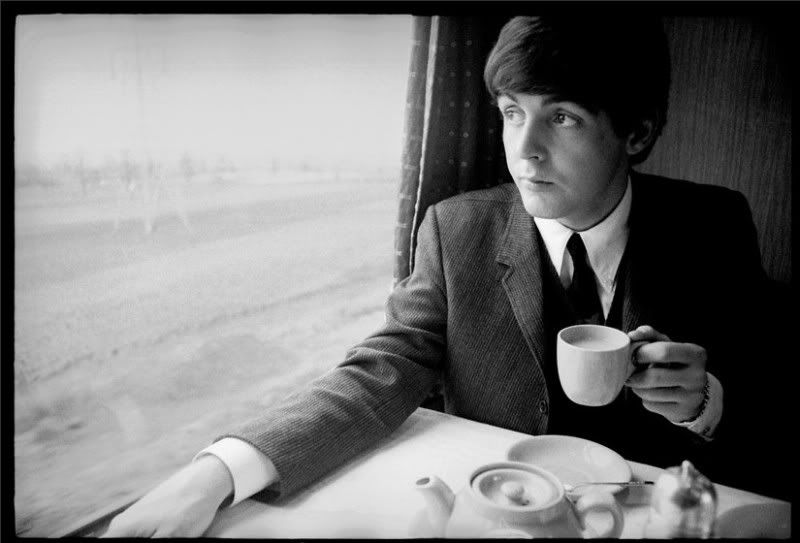 |
| Byrne's helmet. Compare the description |
I've just read Peter Fitzsimon's latest tome, Ned Kelly: The story of Australia's most notorious legend. It's a best seller but I can't think why. While well-researched, it has no new insight into the topic or the people involved. It is written in present tense which according to Fitzsimons gives us the sensation of being there as, apparently, we have never used our imaginations before. If 727 pages of deathless prose like this appeals, by all means read on:
Undoubtedly the best of the helmets is the one that has been made for Joe Byrne. In a clever design twist, a curve at the top of his visor reaches down almost to the bottom, covering the exposure of his nose and leaving his two piercing blue eyes staring out, rather like a bemused koala.
Otherwise, move on. There are many other and better books on Kelly out there.
Fab: An intimate life of Paul McCartney by Howard Sounes is a sometimes sniping tome that again covers well-worn ground without finding anything particularly new. I'm not sure there is any mystery to Paul McCartney, he's a pretty open book. He has an enviable gift for melody, which even John Lennon acknowledged, even if McCartney's detractors won't. He wrote the most covered song of all time in Yesterday, contributed to some of the greatest songs of modern popular music as part of the most influential rock band of all time, and by all accounts puts on a fantastic live show.
There is a quotation in from David Puttnam that I think does sum up McCartney, comparing him to Ridley Scott
[B]oth men of immense, immense, immense talent who on their deathbed are likely to look back on their career with some satisfaction, but with some dissatisfaction, in that I’m not sure that either of them — Ridley and Paul, both very wealthy and everything — I’m not sure either of them has absolutely delivered what was in them.
 Perhaps McCartney's problem was that his songs came too easily, and after Lennon, with rare exception, he never found someone to push him to the heights he was capable of. Mind you, I'd say the same about Lennon, who was a more interesting lyricist, but didn't always avoid the issue of disappearing up his own arse.
Perhaps McCartney's problem was that his songs came too easily, and after Lennon, with rare exception, he never found someone to push him to the heights he was capable of. Mind you, I'd say the same about Lennon, who was a more interesting lyricist, but didn't always avoid the issue of disappearing up his own arse.
On the other hand, would McCartney care? By any definition he's had a successful and happy life, marred with the loss of his first wife and a failed second marriage (which this book dwells on to a distasteful degree) and of course, the loss of the friends of his youth and the partners of his extraordinary early success. He's lived most of his life in the public eye and with astonishing riches. He's been very generous to his family, his home city and friends. And his children all seem quite happy and down to earth. That's a great success there.
Both these biographies suffer from the current affliction, that is the intrusive biographer, which is quite the trend. When I read a biography, I like to think I have heard the voice of the subject and not the author. Jim Henson: the Biography by Brian Jay Jones, is much closer to the old-fashioned style of biography and is all the better for it. By its end, I felt I had learned much more about Henson, and that, however at a remove, I had spent some time in his company. Which by all accounts was a pretty good place to be. This is an authorised biography but I cannot imagine anyone but the most perverse biographer finding much dirt on Henson. His creativity, his supportiveness, his curiosity, his optimism are all in plain view in his work. And his influence goes on today. I'm sure I am not the only person in the world who knows his outlook on humour and life is indebted to both Sesame Street and The Muppet Show, as well as so many other projects. And who but perhaps George Lucas would prefer the CGI Yoda to the original puppet performed by Frank Oz?

Some years before his untimely death Henson wrote two letters to his family to be read after his death. (In one letter he said it felt an odd thing to be doing, but would be much more difficult once he had died.)The second ends like this:
Please watch out for each other and love and forgive everybody. It's a good life, enjoy it.
Now that's a man whose voice is worth hearing.

 Perhaps McCartney's problem was that his songs came too easily, and after Lennon, with rare exception, he never found someone to push him to the heights he was capable of. Mind you, I'd say the same about Lennon, who was a more interesting lyricist, but didn't always avoid the issue of disappearing up his own arse.
Perhaps McCartney's problem was that his songs came too easily, and after Lennon, with rare exception, he never found someone to push him to the heights he was capable of. Mind you, I'd say the same about Lennon, who was a more interesting lyricist, but didn't always avoid the issue of disappearing up his own arse.